2023 KEYNOTE PRESENTATIONS
Thank you for a great 2023 festival! The dates on this page reflect those of the 2023 festival. Subscribe to the Biggest Week eNews for all the latest updates on 2024!
Indigenous Connections to the Birds
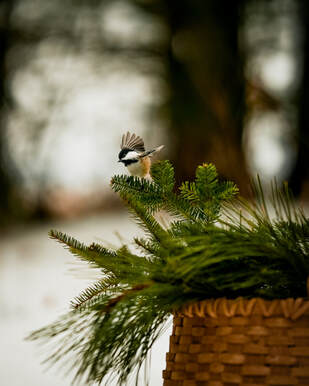
Presented by Alyssa Bardy
Date: Friday, May 5
Time: 4-5 p.m.
Location: Maumee Bay Lodge
Fee: $15
Registration Required: Yes
Alyssa will give a presentation some Haudenosaunee teachings of the birds and the interconnectedness between birds and culture. She will share stories of birds from her nation and describe how the birds have offered her a link to reconnect with her Indigenous roots.
Alyssa is a Cayuga woman currently residing in Kenhte:ke (Tyendinaga Mohawk Territory) with her children and partner. Alyssa is rarely found without her children, binoculars, dogs and camera. She is a self-taught natural light photographer and a lover of the land. Born and raised in rural Ontario, Alyssa was raised with a love and appreciation for a lifestyle immersed in the outdoors. Alyssa’s photography captures the stories of motherhood, Indigenous reconnection, nationhood, and our interconnectedness with the land. With a special focus on nature, story-telling and knowledge sharing, Alyssa uses the lens as a tool for herself, her children, and future generations to learn and share the brilliance and beauty of both culture and creation.
Date: Friday, May 5
Time: 4-5 p.m.
Location: Maumee Bay Lodge
Fee: $15
Registration Required: Yes
Alyssa will give a presentation some Haudenosaunee teachings of the birds and the interconnectedness between birds and culture. She will share stories of birds from her nation and describe how the birds have offered her a link to reconnect with her Indigenous roots.
Alyssa is a Cayuga woman currently residing in Kenhte:ke (Tyendinaga Mohawk Territory) with her children and partner. Alyssa is rarely found without her children, binoculars, dogs and camera. She is a self-taught natural light photographer and a lover of the land. Born and raised in rural Ontario, Alyssa was raised with a love and appreciation for a lifestyle immersed in the outdoors. Alyssa’s photography captures the stories of motherhood, Indigenous reconnection, nationhood, and our interconnectedness with the land. With a special focus on nature, story-telling and knowledge sharing, Alyssa uses the lens as a tool for herself, her children, and future generations to learn and share the brilliance and beauty of both culture and creation.
North American Flycatchers
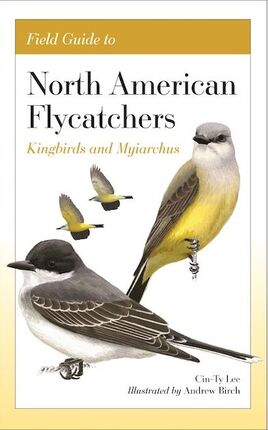
Presented by Cin-Ty Lee and Andrew Birch
Date: Saturday, May 6
Time: 4-5 p.m.
Location: Maumee Bay Lodge
Fee: $15
Registration Required: Yes
The identification of Empidonax flycatchers and pewees can be a daunting challenge for even the most seasoned birder. Cin-Ty Lee and Andrew Birch on an introduction to their new Field Guide to North American Flycatchers. This field guide takes bird identification to a new level by training one to observe subtle differences in structure, color patterns, and vocalizations before delving into the finer details of a particular species. Through this workshop, Cin-Ty and Andrew will show how this tough identification challenge is accessible to everyone, including beginning birders.
Date: Saturday, May 6
Time: 4-5 p.m.
Location: Maumee Bay Lodge
Fee: $15
Registration Required: Yes
The identification of Empidonax flycatchers and pewees can be a daunting challenge for even the most seasoned birder. Cin-Ty Lee and Andrew Birch on an introduction to their new Field Guide to North American Flycatchers. This field guide takes bird identification to a new level by training one to observe subtle differences in structure, color patterns, and vocalizations before delving into the finer details of a particular species. Through this workshop, Cin-Ty and Andrew will show how this tough identification challenge is accessible to everyone, including beginning birders.
Powering Up Conservation: How birders and technology will save our wildlife
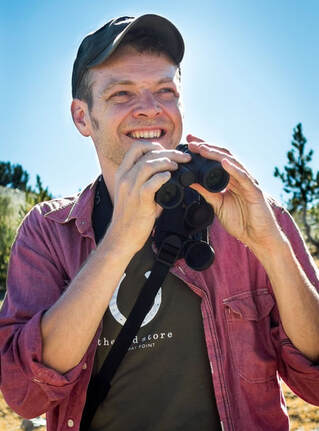
Presented by Scott Whittle
Date: Sunday, May 7
Time: 4-5 p.m.
Location: Maumee Bay Lodge
Fee: $15
Registration Required: Yes
From tiny tags to a global sensor network, technology and birders are an explosive combination for conservation. Our methods and abilities are changing at an almost weekly pace. Over the last few years wildlife tags have been miniaturized to fit on hummingbirds and even insects. At the same time, new crowd-sourced networks are emerging to let us track birds with sound and for the first time are showing us migration live and on a global scale. Expert and Terra co-founder Scott Whittle will catch you up on where we are today, and then look into the future of these amazing technologies and explain how birders can lead the way in the crucial upcoming decades of wildlife conservation.
Date: Sunday, May 7
Time: 4-5 p.m.
Location: Maumee Bay Lodge
Fee: $15
Registration Required: Yes
From tiny tags to a global sensor network, technology and birders are an explosive combination for conservation. Our methods and abilities are changing at an almost weekly pace. Over the last few years wildlife tags have been miniaturized to fit on hummingbirds and even insects. At the same time, new crowd-sourced networks are emerging to let us track birds with sound and for the first time are showing us migration live and on a global scale. Expert and Terra co-founder Scott Whittle will catch you up on where we are today, and then look into the future of these amazing technologies and explain how birders can lead the way in the crucial upcoming decades of wildlife conservation.
100 Plants to Feed the Birds
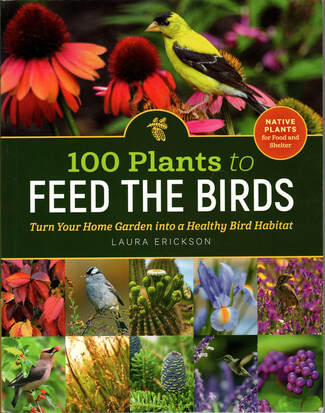
Presented by Laura Erickson
Book signing immediately following the presentation / Books will be available for purchase
Date: Monday, May 8
Time: 4-5 p.m.
Location: Maumee Bay Lodge
Fee: $15
Registration Required: Yes
Even as we keep our binoculars trained on birds, it's important for us to be aware of the plants different birds need for survival—for food, shelter, and nesting materials, and also to harbor the insects and spiders birds need. Laura will talk about the basics of selecting plants to support your favorite local and regional birds, weaving in fun firsthand stories about the interplay between birds, plants, and a clueless birdwatcher.
Book signing immediately following the presentation / Books will be available for purchase
Date: Monday, May 8
Time: 4-5 p.m.
Location: Maumee Bay Lodge
Fee: $15
Registration Required: Yes
Even as we keep our binoculars trained on birds, it's important for us to be aware of the plants different birds need for survival—for food, shelter, and nesting materials, and also to harbor the insects and spiders birds need. Laura will talk about the basics of selecting plants to support your favorite local and regional birds, weaving in fun firsthand stories about the interplay between birds, plants, and a clueless birdwatcher.
The Urban Birder Travels
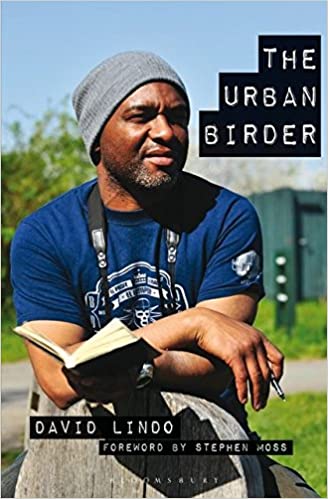
Presented by David Lindo, the Urban Birder
Date: Tuesday, May 9
Time: 4-5 p.m.
Location: Maumee Bay Lodge
Fee: $15
Registration Required: Yes
David Lindo, also known as The Urban Birder, has visited over 300 cities worldwide in search of urban birds. During his travels he has found a surprising number of committed conservationists, interesting birding locations and importantly, many birds. Join him on his journey in and around some of the world's urban areas.
David Lindo is a broadcaster, writer, speaker, educator and bird tour leader. His mission is to engage city folk around the world with the environment through the medium of birds.
He has written countless articles on urban birds, urban conservation and wildlife in general for many websites, publications and magazines and has written the Forwards to several books. He is a regular television and radio presenter and has been featured on the BBC, ITV, Channel 4 in the UK as well as other TV and radio channels around the world including CBS in the United States.
Date: Tuesday, May 9
Time: 4-5 p.m.
Location: Maumee Bay Lodge
Fee: $15
Registration Required: Yes
David Lindo, also known as The Urban Birder, has visited over 300 cities worldwide in search of urban birds. During his travels he has found a surprising number of committed conservationists, interesting birding locations and importantly, many birds. Join him on his journey in and around some of the world's urban areas.
David Lindo is a broadcaster, writer, speaker, educator and bird tour leader. His mission is to engage city folk around the world with the environment through the medium of birds.
He has written countless articles on urban birds, urban conservation and wildlife in general for many websites, publications and magazines and has written the Forwards to several books. He is a regular television and radio presenter and has been featured on the BBC, ITV, Channel 4 in the UK as well as other TV and radio channels around the world including CBS in the United States.
EVENING BANQUET & FEATURED KEYNOTE!
Heartbreak and Hope: A Biologist's Life with Condors
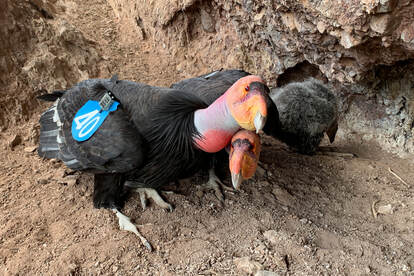
Presented by Erro Lehnert
Date: Wednesday, May 10
Time: Keynote during the Black Swamp Bird Observatory banquet
Location: Maumee Bay Lodge
Fee: $60
Registration Required: Yes
The endangered California Condor population, once near the brink of extinction, has been on the recovery the past several decades due to innovative management techniques and dedicated work by staff biologists and volunteers. Join Erro Lehnert for a glimpse into the life of a condor biologist: an overview of condor biology, the captive breeding and reintroduction program, radio and GPS tracking data, wild nesting and fledgling success- and heartbreak. The future of the largest bird in North America faces many challenges, but thanks to the efforts of dedicated biologists, geneticists, and conservationists, there is hope for the future.
Date: Wednesday, May 10
Time: Keynote during the Black Swamp Bird Observatory banquet
Location: Maumee Bay Lodge
Fee: $60
Registration Required: Yes
The endangered California Condor population, once near the brink of extinction, has been on the recovery the past several decades due to innovative management techniques and dedicated work by staff biologists and volunteers. Join Erro Lehnert for a glimpse into the life of a condor biologist: an overview of condor biology, the captive breeding and reintroduction program, radio and GPS tracking data, wild nesting and fledgling success- and heartbreak. The future of the largest bird in North America faces many challenges, but thanks to the efforts of dedicated biologists, geneticists, and conservationists, there is hope for the future.
The Magee Boardwalk: Birding’s Crown Jewel of Ohio’s Lake Erie Marsh Region
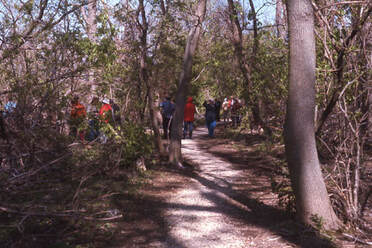
Presented by Mark Shieldcastle
Date: Thursday, May 11
Time: 4-5 p.m.
Location: Maumee Bay Lodge
Fee: $15
Registration Required: Yes
Every spring and fall, millions of feathered marvels and tens of thousands of human followers migrate to the shores of Lake Erie. Here they gravitate to a small seven-acre span of old beach ridge to stage an annual gathering that has continued for millennia for the feathered avian hordes and decades for their followers. This presentation will delve into the history of the area, why it has become the epicenter of birding in the region, and its ecological niche both locally and continentally. Join us as we take a look from the birds’ perspective and our own curiosity of our environment and the joy it brings us.
Date: Thursday, May 11
Time: 4-5 p.m.
Location: Maumee Bay Lodge
Fee: $15
Registration Required: Yes
Every spring and fall, millions of feathered marvels and tens of thousands of human followers migrate to the shores of Lake Erie. Here they gravitate to a small seven-acre span of old beach ridge to stage an annual gathering that has continued for millennia for the feathered avian hordes and decades for their followers. This presentation will delve into the history of the area, why it has become the epicenter of birding in the region, and its ecological niche both locally and continentally. Join us as we take a look from the birds’ perspective and our own curiosity of our environment and the joy it brings us.
Galápagos Islands: Darwin’s Smoking Gun
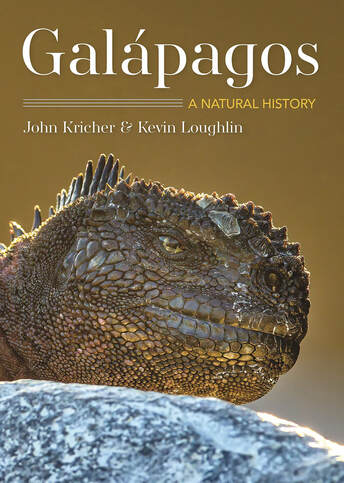
Presented by John Kricher and Kevin Loughlin
Book signing immediately following the presentation / Books will be available for purchase
Date: Friday, May 12
Time: 4-5 p.m.
Location: Maumee Bay Lodge
Fee: $15
Registration Required: Yes
Once the islands were a way station for whalers and pirates. Then the Galápagos Islands, and archipelago 600 miles west of the coast of Ecuador, found a new identity when a young British man, Charles Darwin, arrived during the voyage of the HMS Beagle in September 1835. Darwin spent several weeks exploring four of the main islands and his observations were pivotal to his eventual realization that organisms change with time, that they evolve. Today the Galápagos finches remain a clear and unambiguous example of the reality and ongoing nature of evolution by natural selection.
The Galápagos are ecologically unique. Formed from the plate tectonics of the Pacific Ocean floor, the archipelago has never been connected with mainland South America. Yet it has been repeatedly colonized by a remarkable assemblage of animals and plants that, once present, each followed their own evolutionary trajectories. Visitors to the Galápagos thus enjoy remarkable and close up experiences among such creatures as giant tortoises, marine and land iguanas, the world’s most northern species of penguin, the world’s only flightless cormorant, and an array of others including sea lions, flamingos, sea turtles, exotic fish, and myriads of seabirds such as boobies, storm-petrels, frigatebirds, and the remarkable swallow-tailed gull. High levels of endemism among animals and plants are seen throughout the archipelago, the most important factor in making these islands deserving of the term unique as well as continued strong conservation efforts.
John Kricher and Kevin Loughlin take pleasure in the opportunity to discuss the fauna and flora of the Galápagos Islands as well as delving into the remarkable if not quirky human history on the islands. They will share some of their adventures as well as discuss their collaboration on the second edition of Galápagos: A Natural History.
Book signing immediately following the presentation / Books will be available for purchase
Date: Friday, May 12
Time: 4-5 p.m.
Location: Maumee Bay Lodge
Fee: $15
Registration Required: Yes
Once the islands were a way station for whalers and pirates. Then the Galápagos Islands, and archipelago 600 miles west of the coast of Ecuador, found a new identity when a young British man, Charles Darwin, arrived during the voyage of the HMS Beagle in September 1835. Darwin spent several weeks exploring four of the main islands and his observations were pivotal to his eventual realization that organisms change with time, that they evolve. Today the Galápagos finches remain a clear and unambiguous example of the reality and ongoing nature of evolution by natural selection.
The Galápagos are ecologically unique. Formed from the plate tectonics of the Pacific Ocean floor, the archipelago has never been connected with mainland South America. Yet it has been repeatedly colonized by a remarkable assemblage of animals and plants that, once present, each followed their own evolutionary trajectories. Visitors to the Galápagos thus enjoy remarkable and close up experiences among such creatures as giant tortoises, marine and land iguanas, the world’s most northern species of penguin, the world’s only flightless cormorant, and an array of others including sea lions, flamingos, sea turtles, exotic fish, and myriads of seabirds such as boobies, storm-petrels, frigatebirds, and the remarkable swallow-tailed gull. High levels of endemism among animals and plants are seen throughout the archipelago, the most important factor in making these islands deserving of the term unique as well as continued strong conservation efforts.
John Kricher and Kevin Loughlin take pleasure in the opportunity to discuss the fauna and flora of the Galápagos Islands as well as delving into the remarkable if not quirky human history on the islands. They will share some of their adventures as well as discuss their collaboration on the second edition of Galápagos: A Natural History.
Ornitherapy: Birding is not only fun, it's good for you!
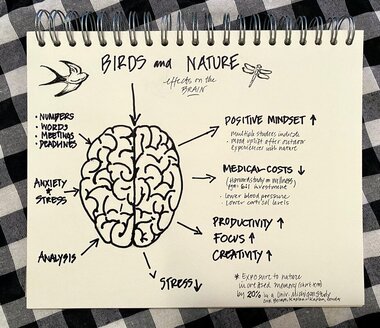
Presented by Holly Merker
Book signing immediately following the presentation / Books will be available for purchase
Date: Saturday, May 13
Time: 4-5 p.m.
Location: Maumee Bay Lodge
Fee: $15
Registration Required: Yes
Learn why getting your daily dose of Ornitherapy is just what the doctor ordered. Long to-do lists, digital demands, people to connect with- life can be busy! If we allow birds and nature to slow us down, we are practicing “selfcare”.
Research shows that exposure to nature actively reduces stress, depression, and anxiety, while helping build a stronger heart and immune system. Birds are gateways into deeper experiences with nature, magnifying these benefits. Through observation, we can learn not only about birds, but gain insight into our own lives while exploring our connection to the world around us. This fosters stewardship and bolsters conservation.
Within the program, we’ll delve into our connections to birds, how to maximize the wellness benefits of birding, and learn about the latest research in the power of nature for overall wellbeing.
Book signing immediately following the presentation / Books will be available for purchase
Date: Saturday, May 13
Time: 4-5 p.m.
Location: Maumee Bay Lodge
Fee: $15
Registration Required: Yes
Learn why getting your daily dose of Ornitherapy is just what the doctor ordered. Long to-do lists, digital demands, people to connect with- life can be busy! If we allow birds and nature to slow us down, we are practicing “selfcare”.
Research shows that exposure to nature actively reduces stress, depression, and anxiety, while helping build a stronger heart and immune system. Birds are gateways into deeper experiences with nature, magnifying these benefits. Through observation, we can learn not only about birds, but gain insight into our own lives while exploring our connection to the world around us. This fosters stewardship and bolsters conservation.
Within the program, we’ll delve into our connections to birds, how to maximize the wellness benefits of birding, and learn about the latest research in the power of nature for overall wellbeing.